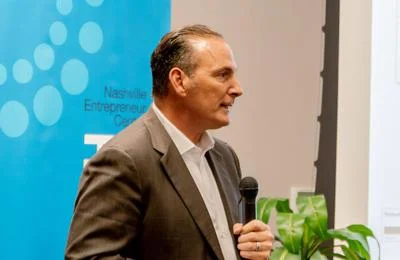Project Healthcare-backed Atadas addresses patient engagement, physician compliance.
By: HANNAH HERNER | OCT 11, 2023
In founding Atadas, software veteran Bill Farr was inspired by his brother’s work as a physician who specializes in addiction treatment. Physicians prescribing medications like buprenorphine or suboxone to curb withdrawal symptoms and cravings for patients with opioid use disorder need to track dosing and stay within varying state guidelines. Through a patient app and provider database, Atadas also seeks to keep patients engaged in their treatment.
Named after a Hungarian term meaning “lean on me,” Atadas started in Salt Lake City in 2020, and Farr moved his family and the business to Nashville in 2021. The company is part of Nashville Entrepreneur Center’s Project Healthcare 2023 cohort.
Farr told the Post that since moving to Nashville, the company has grown from a handful of providers and 200 to 300 patients to 600 providers and 15,000 patients. Atadas serves 10 states, including three Nashville clinics and a total of 15 clinics throughout Tennessee.
What does the software do?
Atadas is selling its services to addiction treatment clinics, with the software customized to meet United States Drug Administration, state and managed care organization guidelines. For example, the Tennessee version of the software has a reminder for providers to have a conversation about tapering off the medication every six months — a state requirement.
When physicians ask for randomized pill counts to ensure patients aren’t selling or taking too much of the medication, patients can prove the count through submitting a photo, rather than having to commute to a clinic. The app also features a secure messaging system for patients to reach their physicians as well as telehealth capabilities.
Atadas uses data including response times, missing appointments and social determinants of health combined with AI to anticipate which patients are most likely to drop out of treatment, too.
“With that patient population, we can give a percent probability of dropout so that [physicians] can intervene early,” Farr said. “If someone drops out of treatment, there’s more risk of drug overdose, more risk of emergency department visits, which taxes the health care system. There’s a vested interest for everyone — for patient outcomes — for providers and for payers to keep these patients in treatment.”
How will the company grow?
In June, Atadas announced its largest partnership to date, with Brentwood-based outpatient addiction clinic Spero Health. The company also partners with local women’s clinic The Next Door. Atadas is co-applying with local organizations to state opioid abatement grants.
In the future, Farr would like to expand the services beyond addiction clinics to include recovery courts, managed care organizations and prisons.
“We have some really interesting feedback from patients,” Farr said. “It’s definitely a need. Our challenge in scaling is working with the right kind of partners to scale what we do. Because electronic health record systems don’t do what we do. Patient engagement apps don’t do what we do. We fit in between.”
Why now?
Earlier this year the Biden administration instituted the MAT Act, which lessened the amount of training required to prescribe medication for opioid use disorder. Because of this, any health care provider with a standard DEA controlled medication license can prescribe medication-assisted treatment without any federal patient caps.
Farr said more health care professionals prescribing the medication means more of them may need tech support that Atadas provides.
While it could work for other prescriptions, Atadas has focused on medication for opioid use disorder to start because it’s a well-funded area, Farr said, especially with opioid abatement money pouring in, and grant funding from National Institute of Health, U.S. Department of Health and Human services and others.
Using medication-assisted treatment has also become more widely accepted.
“I think what’s evolved is the acceptance,” Farr said. “I believe that opioid addiction is a brain disease. It’s different from tobacco or alcohol in terms of how it affects sensors in the brain. Hence, there might be different treatment modalities for it than other kinds of addictions. With that, MAT plays a role to help those people get back into a normal lifestyle, and then make decisions on what they want to do with their own treatment.”

